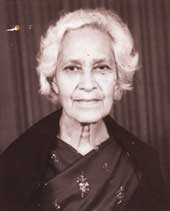 |
 |
| Queenie Rynjah with other participants at the Beijing conference and (top) the multi-faceted leader in Shillong |
A sense of serenity pervades the home of the quiet and genteel lady. Though she catapulted into the limelight with the Padmashree in the field of social service, Queenie Rynjah chooses to shun publicity and makes no bones about it. A woman of few words and infectious laughter, Queenie’s petit frame and close-cropped fleecy hair exudes a homespun quality.
The octogenarian has come a long way as an educationist and social worker, but shows none of the fatigue or smugness of a woman of many facets. When the news of her award came to her on the radio, Queenie was reluctant to believe it. Finally, when the home ministry called to confirm the honour, she knew there was no escaping the reality of her achievements.
Flooded with encomiums in the twilight of her life, Queenie chooses to let silence do the talking. The former principal of Pinemount School does not go into raptures over her teaching career and treats even her participation at the Women’s Conference in Beijing as far too commonplace to merit discussion.
Queenie is a far cry from the feisty, firebrand feminists who take up cudgels with a great hue and cry. She is a feminist without forfeiting her femininity, empathising with women who need her helping hand. As president of three key social organisations, including the Ka Seng Teilang Kanthei, Synjuk Kynthei and the larger Ka Lympunj Ki Seng, Queenie has gone all out to help people in distress. What affects her most is the rampant violence against women, especially in the villages. “Our legal system is so flawed that women are forever getting the rough end of it,” she rues with a sigh.
Despite her best efforts, Queenie has had to watch murderers and rapists go scot-free simply because they were not chargesheeted by the law. But that has not stopped this frail woman from raising her voice against crimes or standing up for what she thought was right. Issues ranging from environment to education and afforestation affect her deeply, which is why they form the corpus of her concerns at Ka Lympunj Ki Seng with which 22 organisations have merged under her tutelage.
At Mylliem, Queenie’s involvement with Synjuk Kynthei has ensured the smooth running of a crèche, a pre-primary school and a little dispensary with a midwife and a visiting doctor. The care at the crèche is not just confined to needy children. Their mothers, too, are often provided with health drinks and basic necessities on being hospitalised.
Funding for such mammoth projects has never been easy, but Queenie explains that the Meghalaya Advisory Board provides an annual, though meagre, grant for Synjuk’s expenses. Along with her peers, Queenie holds fetes or sale of products (knitted goods, tailored clothes and food) to raise additional funds of Rs 50,000-Rs 60,000 every year. People whose children spend their day at the crèche also give donations, while MPs have reached out to help in construction of buildings.
A crèche and vocational training centre (in crafts, tailoring and embroidery) have made a great difference in the lives of the underprivileged in Queenie’s own neighbourhood. It was this small association called Ka Seng Teilang Kanthei at Laban, which initiated Queenie into social work over two decades back.
“When the government wanted to introduce Assamese in the state, some of the boys in our locality were injured in the scuffles and shootouts. As they lay at the civil hospital, some of us decided to visit them with money and stand by them in the hour of crisis,” she reminisces. The incident spurred Queenie to do her bit for society and she threw herself into active social service. “I saw my life change almost overnight,” she recalls with a look of great contentment.
However, in an age that puts a premium on hype and publicity, Queenie realised that social work is no longer a means for self-effacement but an excuse for socialising. “It is often a lifestyle statement for the ladies of leisure and there are actually very few people who choose to do the donkey’s work,” she confesses with candour.
While social service was a turning point in her life post-retirement, it was teaching which took up her time in a career spanning the fifties right up to the late seventies. “When I first started teaching, the syllabus was much lighter and children, too, had solid knowledge. They were encouraged to ask questions and interact with the teachers. Today, studies have become so time-consuming that children have no time for play and recreation. Even that bonding between a teacher and student is missing,” laments Queenie, adding as an afterthought, “Classes have become so big that it often becomes unmanageable for the teacher to discipline her pupils.”
However, Queenie never forced her pupils to burn the midnight oil just as she never crammed for examinations during her days at school. “We had such good teachers that it seemed natural that I would do my BT and take up teaching as a career,” she reflects with a faraway look in her eyes.
The fourth among nine children, Queenie recalls “a happy childhood in an era that had so much peace and serenity”. The daughter of an Anglo-Indian father and Jaintia mother, Queenie looked forward to the “big feast during Christmas, which was always a happy occasion”.
Brought up in a large family where filial bonds ran strong, Queenie inculcated the same values in her four sons of whom she is very proud. “If one spends time with the children, the dividends are great,” she says with a smile. Though a product of a matrilineal society, which values the birth of a daughter, Queenie has no regrets about her “very understanding sons” who have distinguished themselves in various capacities.
She is also looks back on her marriage with a great deal of contentment when her early years were spent travelling with her husband. “His job as an Indian Forest Service official took us to places like Tezpur and Jorhat though we had based ourselves in Shillong and even built a house,” she explains.
Having lost her husband a few years ago, Queenie recalls how men of his time were “honest and upright with the Christian background making a huge difference”. Now that she is well beyond her prime, Queenie could easily bask in her laurels and lead a life of indolence. But she is always on the move — shopping, sewing, meeting up with her social service peers, to keep herself busy.
Nurturing a special fondness for gardening — her orchard’s oranges are a sight to behold — she likes being in the open “for the fresh air, sunshine and peace”. Besides, watching things grow makes her feel close to the creator and sustains her with energy and vitality.
In the middle of her manifold duties, Queenie manages to “keep a happy disposition”. It is, as she reveals, the secret of a long life, and needless to say, a life well-lived.










